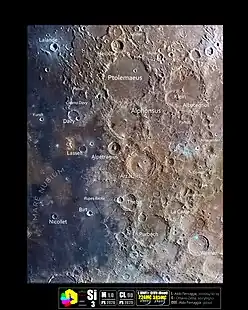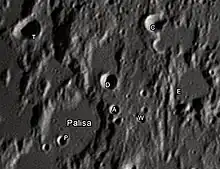Palisa (crater)
Palisa is the remnant of a lunar impact crater that is located to the west of the walled plain Ptolemaeus. It lies to the north-northeast of the crater Davy, and is attached to the lava-flooded satellite crater Davy Y by a wide break in the southwest rim. The crater is named after the Austrian astronomer Johann Palisa.[1]

 Apollo 16 image | |
| Coordinates | 9.4°S 7.2°W |
|---|---|
| Diameter | 33 km |
| Depth | 0.9 km |
| Colongitude | 7° at sunrise |
| Eponym | Johann Palisa |
The rim of Palisa is worn and eroded, especially in the western half where there are multiple gaps that join the crater floor to the Mare Nubium to the west. The interior is nearly flat, and marked only by a pair of tiny craterlets in the southwest gap. The larger of this crater pair is designated Palisa P. Additional satellite craterlets D, A, and W lie just outside the northeast rim.
Satellite craters

By convention these features are identified on lunar maps by placing the letter on the side of the crater midpoint that is closest to Palisa.
| Palisa | Latitude | Longitude | Diameter |
|---|---|---|---|
| A | 9.0° S | 6.7° W | 5 km |
| C | 7.7° S | 6.4° W | 9 km |
| D | 8.6° S | 6.9° W | 8 km |
| E | 8.4° S | 5.7° W | 18 km |
| P | 9.6° S | 7.3° W | 5 km |
| T | 8.2° S | 8.2° W | 12 km |
| W | 9.1° S | 6.3° W | 4 km |
References
- "Palisa (crater)". Gazetteer of Planetary Nomenclature. USGS Astrogeology Research Program.
- Andersson, L. E.; Whitaker, E. A. (1982). NASA Catalogue of Lunar Nomenclature. NASA RP-1097.
- Bussey, B.; Spudis, P. (2004). The Clementine Atlas of the Moon. New York: Cambridge University Press. ISBN 978-0-521-81528-4.
- Cocks, Elijah E.; Cocks, Josiah C. (1995). Who's Who on the Moon: A Biographical Dictionary of Lunar Nomenclature. Tudor Publishers. ISBN 978-0-936389-27-1.
- McDowell, Jonathan (July 15, 2007). "Lunar Nomenclature". Jonathan's Space Report. Retrieved 2007-10-24.
- Menzel, D. H.; Minnaert, M.; Levin, B.; Dollfus, A.; Bell, B. (1971). "Report on Lunar Nomenclature by the Working Group of Commission 17 of the IAU". Space Science Reviews. 12 (2): 136–186. Bibcode:1971SSRv...12..136M. doi:10.1007/BF00171763. S2CID 122125855.
- Moore, Patrick (2001). On the Moon. Sterling Publishing Co. ISBN 978-0-304-35469-6.
- Price, Fred W. (1988). The Moon Observer's Handbook. Cambridge University Press. ISBN 978-0-521-33500-3.
- Rükl, Antonín (1990). Atlas of the Moon. Kalmbach Books. ISBN 978-0-913135-17-4.
- Webb, Rev. T. W. (1962). Celestial Objects for Common Telescopes (6th revised ed.). Dover. ISBN 978-0-486-20917-3.
- Whitaker, Ewen A. (1999). Mapping and Naming the Moon. Cambridge University Press. ISBN 978-0-521-62248-6.
- Wlasuk, Peter T. (2000). Observing the Moon. Springer. ISBN 978-1-85233-193-1.